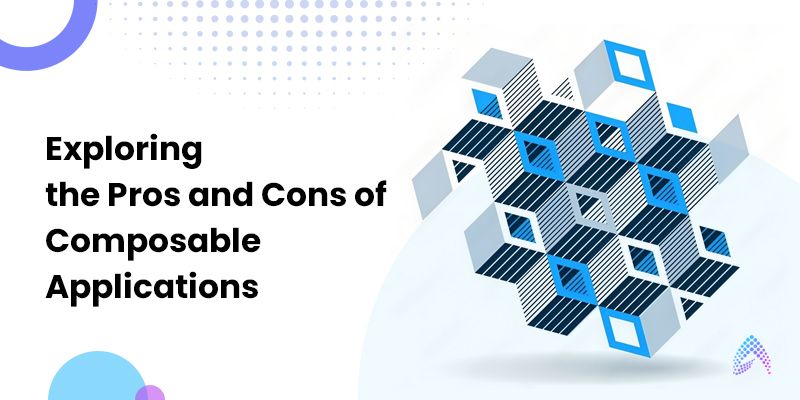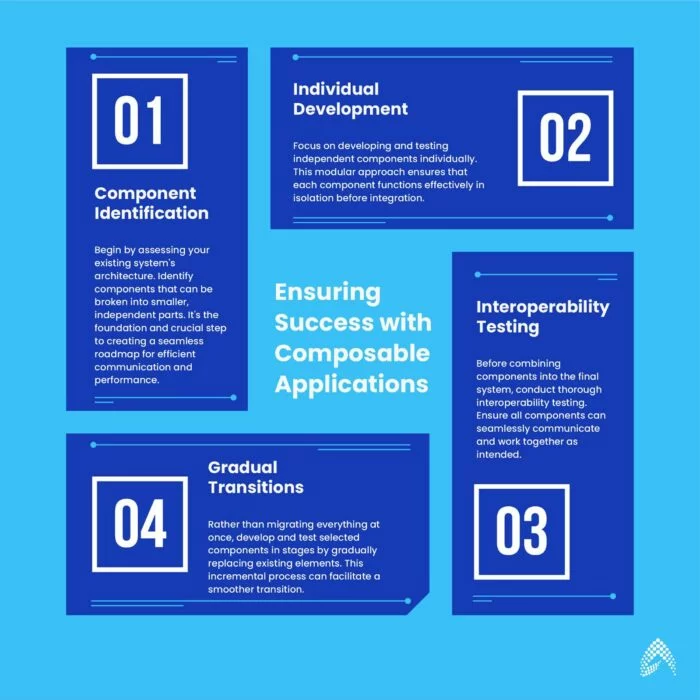Exploring the Pros and Cons of Composable Applications

Organizations can easily accelerate software development processes by simply enabling the reuse of code and eliminating (or at least reducing) the need to develop code from scratch. Furthermore, code modules can be combined to build new applications, saving your time, money, and effort by 40 to 50%. This methodology is known as “composability” and composable applications are one of the key paths to achieving digital transformation.
Composable Applications are built around Application Programming Interfaces (APIs) and microservices, enabling app communication and increasing business efficiency. Microservices are small, independent services that perform a specific task. APIs are interfaces that allow microservices to communicate with each other.
You can also read more about composable architecture in my other blog post.
Today, let’s explore a few ideas and thoughts on the pros and cons of composable applications.
Advantages of composable apps |
Challenges with composable apps |
|---|---|
| Accelerates integration and innovation:
Composable Applications are driven by APIs and PBCs. Therefore, you can pick and integrate various functions without coding hassles and compatibility issues. As you can develop departmental-level and process-specific applications, the composable architecture enables innovation across your organization. |
Managing more components:
Composable Applications include multiple microservices that were not initially designed to work together. It often poses complexity in developing, debugging, and maintenance and lacks standardization. |
| Automation and upgrades will happen regularly:
Composable applications can be developed, deployed, and upgraded quickly multiple times a day to meet evolving needs and address process-specific requirements. Composable applications developed with LCNC platforms accelerate automation and upgrades by at least 40x faster. |
Reliability and performance:
Composable applications have numerous dependencies on external services, APIs, and libraries. Managing these dependencies and monitoring performance in real time can be a challenge. |
| Increased Scalability:
Composable Applications come along with quick scaling innovation and digital creativity. By enabling your development team to connect different software components with APIs, composability helps your business create new productivity-increasing operations at a relatively low cost. |
Interoperability and Communication Challenges:
In Composable Applications, each microservice is developed independently using different programming or data storage solutions and communicates through APIs. Changes to these APIs can break compatibility between services and lead to interoperability challenges. |
| Cost Efficiency:
Code reusability is one of the best benefits of Composable Applications. By reusing components and integrating third-party services, composable applications can significantly reduce development costs. The ability to scale resources up and down based on real-time needs further optimizes operational expenses. |
Data Inconsistency:
Composable applications rely on multiple microservices, each of which may have its own database or data source. These distributed data sources can introduce complexities in maintaining data consistency. |
| Reduced Vendor Lock-in:
With Composable Applications, you have the freedom to choose the best-in-class components that enhance business continuity. This flexibility reduces the dependency on a single vendor or technology stack. |
Testing and QA:
Since various elements of the system can be developed by different teams, it is important to ensure that testing and QA processes are standardized and well-documented. |
| Risk Mitigation:
In composable applications, if one component fails or doesn’t work properly, you can replace it with another component without affecting the overall functionality. This feature can considerably mitigate application-level risks. |
Security:
Composable Applications rely on multiple microservices and data sources with different security requirements and vulnerabilities. Therefore, it is critical to monitor and audit the entire system for security breaches and potential threats. |
If there are challenges with composable applications, are they really useful?
Even though the above challenges might come as a bit of a surprise, and you might be thinking whether they are a good choice for your organization, the benefits do outweigh the problems. Here are a few pointers to help you ensure success with composable applications:

1. Component Identification: Begin by assessing your existing system’s architecture. Identify components that can be broken into smaller, independent parts. It’s the foundation and crucial step to creating a seamless roadmap for efficient communication and performance.
2. Individual Development: Focus on developing and testing independent components individually. This modular approach ensures that each component functions effectively in isolation before integration.
3. Interoperability Testing: Before combining components into the final system, conduct thorough interoperability testing. Ensure all components can seamlessly communicate and work together as intended.
4. Gradual Transitions: Rather than migrating everything at once, develop and test selected components in stages by gradually replacing existing elements. This incremental process can facilitate a smoother transition.
At Amzur, we sincerely believe that composable applications can make your enterprise more agile and innovative. More on this to come in subsequent blog posts.
Composability can unleash your full potential to develop applications at the speed needed.

President & CEO – Growth Markets




